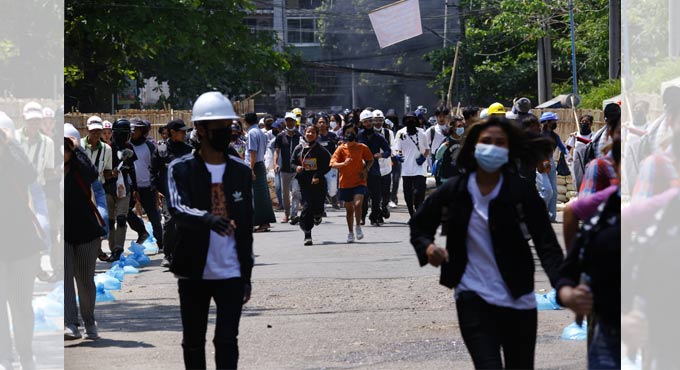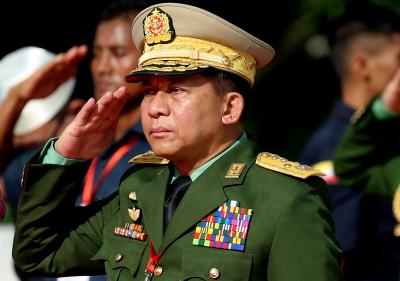Myanmar junta chokes information flow as protests intensify
No privately owned newspapers were published this past week for the first time in eight years, following bans and voluntary suspensions.

Yangon: Authorities in Myanmar arrested a spokesman for ousted leader Aung San Suu Kyi’s political party as they intensify efforts to choke off the spread of information about growing protests against last month’s military takeover.
Despite a crackdown that has killed more than 200 demonstrators so far, protesters were back in the streets on Friday morning in several cities and towns. Some rallies proceeded without incident, but in Aungban town in eastern Shan state, online Tachileik News Agency reported that at least seven people were injured when security forces sought to break up their march using tear gas, rubber bullets and live ammunition.
The independent Assistance Association for Political Prisoners reported that as of Thursday, it had verified 224 killings linked to the coup’s aftermath, more than half of them in Yangon, the biggest city. It said 2,258 people have been arrested or charged, with 1,938 still detained or evading arrest.
Kyi Toe, a spokesman for the National League for Democracy, was arrested on Thursday, according to a Facebook post by Phyo Zeya Thaw, an elected lawmaker from his party. The arrest was also reported on Friday by Mratt Kyaw Thu, a respected local journalist.
Kyi Toe had been a major source of information in the early days following the February 1 coup, after State Counsellor Suu Kyi and President Win Myint were taken into custody by the army along with other senior party members. The takeover kept NLD and other lawmakers from taking the seats they won in last November’s election.
The coup reversed years of slow progress toward democracy after five decades of military rule. Suu Kyi’s party was due to to take power for a second five-year term after the landslide election victory.
No privately owned newspapers were published this past week for the first time in eight years, following bans and voluntary suspensions. The military government also has banned at least five local news organizations from disseminating information on any platform, print, broadcast or online, but its orders were mostly ignored. About 40 journalists have been arrested, with roughly half still in detention, including Thein Zaw of the Associated Press.
Restrictions on the internet have been in place since shortly after the coup. They started with a largely ineffective block of social media platforms including Facebook and Twitter, and were followed by a nightly suspension of mobile internet access from 1 am to 9 am, which escalated since last Sunday to a round-the-clock stoppage. Broadband Wi-Fi service remains available, though spotty.
The flow of information is even more restricted in six townships of Yangon, which have been under martial law since Monday. Movement in and out of those neighbourhoods is difficult, and some residents have reported having their electricity cut off.
Those neighbourhoods were wracked by police violence on Sunday, with dozens of protesters killed.
In one of the strongest statements issued by a fellow Southeast Asian nation, Indonesian President Joko Widodo on Friday urged a halt to violence in Myanmar and asked other leaders to hold a regional summit on the crisis.
“Indonesia urges that the use of violence in Myanmar be stopped immediately to avoid more victims. The safety and welfare of the people must be a top priority,” Widodo said in a televised address, offering his condolences to the victims and their families.
“Indonesia also urges dialogue and reconciliation to be carried out immediately to restore democracy, peace and stability in Myanmar.” Widodo, the leader of Southeast Asia’s largest economy, said that he will immediately speak with Brunei, the current chair of the Association of Southeast Asian Nations, to set up a meeting of leaders of its 10 member countries.
Widodo’s move came after ASEAN foreign ministers held a March 2 meeting at which they reached no consensus on the crisis.
Related News
-
Bhutan’s Sonam Yeshey sets T20 world record, becomes first player to take 8 wicket haul
-
CBI cracks down on digital arrest scam, chargesheet filed against 13 accused
-
270 Indians brought back from Thailand after escaping Myanmar cybercrime centre
-
Myanmar sets December 28 elections amid conflict and criticism
-
Odisha government reviews protection of Lord Jagannath temple lands
2 hours ago -
Iran holds military drills with Russia as US carrier moves closer
2 hours ago -
This is taxpayers’ money: Supreme Court raps freebies culture
3 hours ago -
Hyderabad: Residents oppose Gandhi Sarovar Project over ‘forcible’ land acquisition
3 hours ago -
Australia level series as Indian women slide to 19-run defeat in second T20I
3 hours ago -
Karnataka beat Uttarakhand in semis, to face Jammu and Kashmir in Ranji final
3 hours ago -
Five Osmania varsity players in South Zone squad for Vizzy Trophy
3 hours ago -
Disciplined West Indies bundle out Italy with ease, tops Group C in T20 WC
3 hours ago




